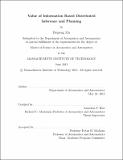| dc.contributor.advisor | Jonathan P. How. | en_US |
| dc.contributor.author | Mu, Beipeng | en_US |
| dc.contributor.other | Massachusetts Institute of Technology. Department of Aeronautics and Astronautics. | en_US |
| dc.date.accessioned | 2013-11-18T20:41:27Z | |
| dc.date.available | 2013-11-18T20:41:27Z | |
| dc.date.copyright | 2013 | en_US |
| dc.date.issued | 2013 | en_US |
| dc.identifier.uri | http://hdl.handle.net/1721.1/82487 | |
| dc.description | Thesis (S.M.)--Massachusetts Institute of Technology, Dept. of Aeronautics and Astronautics, 2013. | en_US |
| dc.description | This electronic version was submitted and approved by the author's academic department as part of an electronic thesis pilot project. The certified thesis is available in the Institute Archives and Special Collections. | en_US |
| dc.description | Cataloged from department-submitted PDF version of thesis | en_US |
| dc.description | Includes bibliographical references (p. 85-92). | en_US |
| dc.description.abstract | In multi-agent applications it is often the case that not all information is equally valuable to the missions, and agents are typically resource limited. Therefore it is important to ensure that the resources are spent on getting and conveying valuable information. This thesis presents efficient distributed sensing and planning algorithms that improve resource planning efficiently by taking into account the obtainable Value of Information (VoI) and improve distributed sensing efficiency by ensuring agents only broadcast high value measurements. The first result focuses on communication efficient distributed sensing algorithms. In particular, agents broadcast their measurements only when the VoI in their measurements exceeds a pre-defined threshold. The VoI threshold is further adaptively adjusted to better balance between the communication cost incurred and the longterm accuracy of the estimation. Theoretical results are presented establishing almost sure convergence of the communication cost and estimation error for distributions in the exponential family. Moreover, an algorithm that automatically forgets old information is also developed to estimate dynamically changing parameters. Validation through numerical simulations and real datasets show that the new VoI-based algorithms can yield improved parameter estimates than those achieved by previously published hyperparameter consensus algorithms while incurring only a fraction of the communication cost. The second result focuses on efficient distributed planning algorithms. In particular, in a system with heterogeneous agents, a coupled planning framework is presented that evaluates the sensing/exploration activities by the improvement on mission returns. Numerical results shows that the coupling between exploration and tasking agents encourages better cooperation between them, thus leading to better performance than decoupled approaches. A hardware testbed is developed to demonstrate the performance improvements of the coupled approach in context of distributed planning with uncertain target classifications. | en_US |
| dc.description.statementofresponsibility | by Beipeng Mu. | en_US |
| dc.format.extent | 92 p. | en_US |
| dc.language.iso | eng | en_US |
| dc.publisher | Massachusetts Institute of Technology | en_US |
| dc.rights | M.I.T. theses are protected by
copyright. They may be viewed from this source for any purpose, but
reproduction or distribution in any format is prohibited without written
permission. See provided URL for inquiries about permission. | en_US |
| dc.rights.uri | http://dspace.mit.edu/handle/1721.1/7582 | en_US |
| dc.subject | Aeronautics and Astronautics. | en_US |
| dc.title | Value of information based distributed inference and planning | en_US |
| dc.type | Thesis | en_US |
| dc.description.degree | S.M. | en_US |
| dc.contributor.department | Massachusetts Institute of Technology. Department of Aeronautics and Astronautics | |
| dc.identifier.oclc | 862233273 | en_US |
